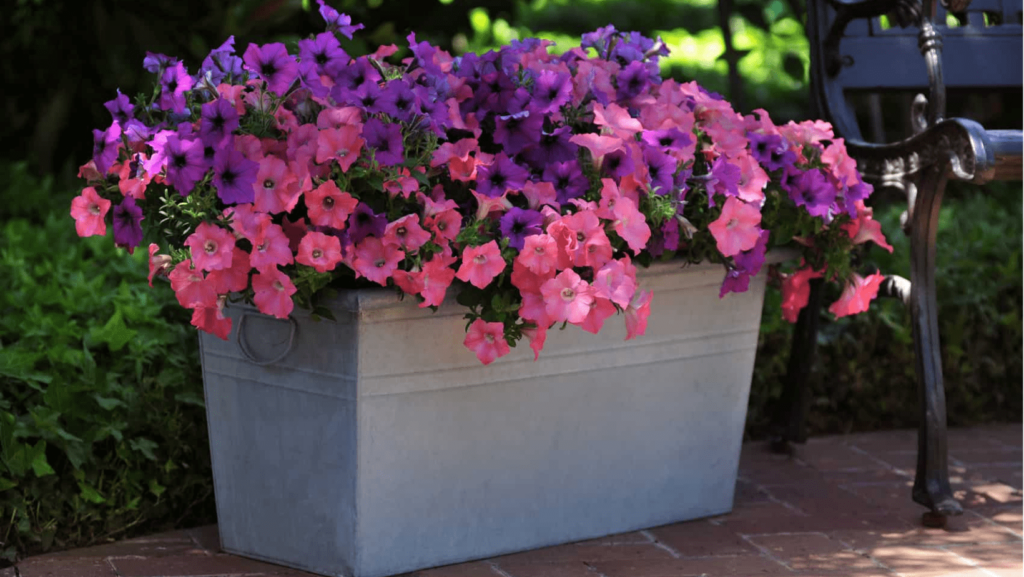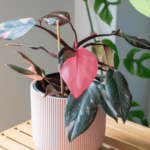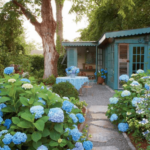For gardening enthusiasts seeking vibrant, low-maintenance blooms, both Supertunias and Supertunia Vistas offer captivating options. However, these powerhouse performers hold distinct characteristics that cater to specific design visions. Let’s explore these petunia varieties, empowering you to select the perfect addition to your flourishing garden.
| Feature | Supertunia | Supertunia Vista |
| Size (height) | 6-12 inches | Up to 2 feet |
| Size (spread) | 18-24 inches | 3-4 feet |
| Habit | Mounding to spreading | Vigorous, mounding with trailing |
| Flower Size | Medium to large | Medium |
| Color & Varieties | Widest range (solids, patterns, veined) | Fewer options (mostly solids) |
| Sun Tolerance | Full sun | Full sun |
| Watering Needs | Moderate | Moderate |
| Maintenance | Easier (occasional deadheading) | More frequent deadheading |
| Discovery | Late 20th century | Late 20th century |
RELATED BLOG:
- WHAT IS DIFFERENCE BETWEEN SUPERTUNIA AND SUPERBELLS?
- 5 Popular Supertunia for your Garden in 2024
Size
Supertunia
Supertunia often reaches a height of 6 to 12 inches, which is compact to mid-range. Their spread is between eighteen and twenty-four inches, which produces a lovely mounding to spreading look. They are perfect for borders, edging pathways, or bringing some color to container gardens because of their size.
Supertunia Vista
This location fulfils your desire for a more dramatic presence. These strong growers live up to their name, “Vista,” which translates to “view” in Italian. They can reach heights of up to two feet. They are ideal for generating overflowing hanging baskets or providing a cascading elegance to large pots because to their enormous spread, which stretches 3 to 4 feet wide. They make dramatic fillers in flower beds or striking focal points in landscapes.

Behavior and Development Sequences
Supertunia
Envision a plant whose development pattern is exquisitely balanced. Supertunia forms a foundation that progressively widens and displays a mounding to spreading habit. This gives the image of being full and lush, which is perfect for giving garden beds or pots more depth and texture.
Supertunia Vista
Be ready for an incredible spectacle! Supertunia Vista has a strong mounding habit that leans heavily toward trailing. Envision an abundance of flowers filling a base, spilling over the sides of pots and baskets to form a captivating waterfall of hues. They are an excellent option for vertical gardening or bringing drama to hanging planters because of their vigorous growth pattern.
Varieties
Supertunia
- Dazzling Diversity: Nearly 40 unique varieties, according to Proven Winners, a leading breeder.
- Color Extravaganza: Solid hues, bi-colors, and veined varieties offer a kaleidoscope of options.
- Flower Power: Medium to large blooms in single and even double forms for a touch of elegance.
Supertunia Vista
- Focused Functionality: Significantly fewer varieties (around 10-15) prioritize a cascading habit for larger containers and hanging baskets.
- Color Palette: Primarily solid colors like bubblegum pink and classic white ensure a uniform display.
- Medium Marvels: Flowers consistently showcase a medium size for a visually pleasing cascade.
Reason for Fewer Supertunia Vista Types:
Supertunia Vistas are bred for their larger size and trailing habit. Breeders focus on core colors to maintain the cascading effect desired, leading to a smaller but highly effective selection.
Flower Power
Supertunia
Get ready to be mesmerized by the breathtaking show of blossoms. They are available in every conceivable combination of hues and patterns, ranging from traditional solids to eye-catching bi-colours, veined variations, and even stunning blooms shaped like stars. For an eye-catching presentation, flower sizes usually vary from medium to huge.
Supertunia Vista
Although Supertunia Vista has an amazing assortment of blooms, the variety leans more toward solid hues. But their bulk and availability more than makeup for their lack of variation. These petunias yield an abundance of medium-sized blooms that cover the entire plant, resulting in a sea of vivid color.
Sun Tolerance
Supertunia and Supertunia Vista
They both adore sunshine. They need at least 6 to 8 hours of direct sunshine every day to survive, thus they do best in full sun areas. This guarantees maximum growth, promotes abundant blooming, and maintains a vibrant green color for the foliage.
Essentials of Hydration
Supertunia and Supertunia Vista
Both Supertunia and Supertunia Vista have modest watering requirements. They dislike damp soil, but they do like steady moisture. When the top inch of soil appears dry to the touch, try to water deeply. You may need to water your plants more frequently during times of extreme heat or drought in order to keep them from wilting.
Tips
Both Supertunia and Supertunia Vista are excellent choices for long-lasting color in your garden.
Supertunia Vista is a good option for filling large containers or creating a cascading effect in hanging baskets.
Supertunia is more versatile due to its compact size and wider variety of colors and flower types.
Maintenance
Supertunia
Though usually thought to be simpler to care for, Supertunia occasionally has to have its wasted flowers deadheaded. This promotes constant flowering all through the growing season. Pinching off the faded flower head just below the calyx, or the green sepals enclosing the flower bud, is the straightforward procedure known as “deadheading.”

Supertunia Vista
Because they bloom so often, Supertunia Vista may need more frequent deadheading in order to keep their best appearance and promote the growth of new flowers. But the payoff is an endless parade of colorful flowers all season long.
Beauty’s Legacy
Supertunia and Supertunia Vista
These two eye-catching petunia varieties are the result of late 20th-century horticultural innovation. Petunia breeders sought to produce plants with improved disease resistance, increased performance, and a greater variety of colours and growth patterns. As a result, Supertunia and Supertunia Vista became incredibly popular and brightened gardens for many years.







